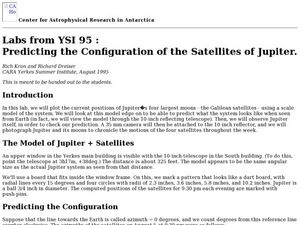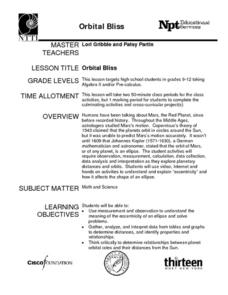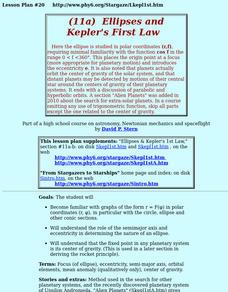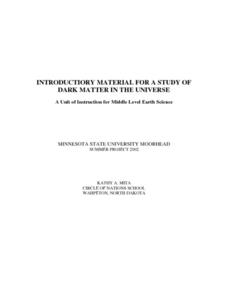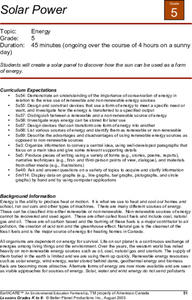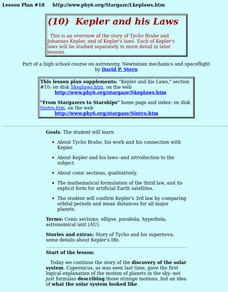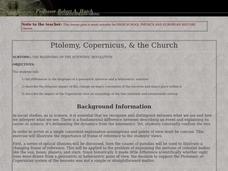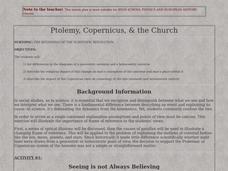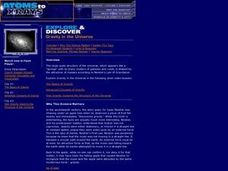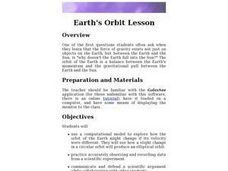Curated OER
How Does a Satellite Stay in Orbit?
Students explore placing a satellite into orbit, then about forces needed to keep an object in orbit. They examine how satellites orbit in elliptical paths and about properties of ellipses. They learn Kepler's 3rd Law of Planetary Motion
Curated OER
Predicting the Configuration of the Satellites of Jupiter
Students plot the positions of the planet Jupiter while predicting what the configuration system looks like from Earth. In this configuration of satellites lesson, students photograph Jupiter and its moons to record the motions of the...
Curated OER
Orbital Bliss
Most young mathematicians are aware that the planets don’t orbit the sun in a circle but rather as an ellipse, but have never studied this interesting feature. This resource looks at the planetary orbits in more detail and helps learners...
Curated OER
Observing Mars in the Night Sky
High schoolers compare and contrast the orbits of Earth and Mars, locate the planet Mars, and diagram its retrograde motion.
Curated OER
The Discovery of the Solar System
High schoolers study the ideas behind the heliocentric theory of Copernicus. They examine about retrograde motion of the planets as they move around the sun. They study astronomers who include Ptolemy, Copernicus, and Galileo.
Curated OER
The Solar System and the Forces Behind It
Sixth graders discover why planets stay in orbit. In groups, they use everyday materials to examine the effect of gravity of objects and calculate how mass changes based on gravitational pull. To end the instructional activity, they...
Curated OER
Worksheet 21 Spring 1996
In this math learning exercise, learners consider a path around the unit circle parameterized by σ on the interval [0, 1] with σ(t) = sin(5πt − π), cos(5πt − π). Then they find the vector.
Curated OER
A Tour of the Solar System
Students construct a spacecraft out of Lego blocks and other materials. They work on their models in small groups while building. They become familar with the planets while working cooperatively.
Curated OER
The Discovery of the Solar System
Students explain the observed motion of the planets. The inner ones move back-and-forth across the position of the Sun, while the outer ones usually advance in one direction, but with occasional temporary reversals known as "retrograde...
Curated OER
Ellipses And Kepler's First Law
Students explain that planets actually orbit the center of gravity of the solar system, and that distant planets may be detected by motions of their central star around the centers of gravity of their planetary systems.
Curated OER
Nature of Meteor Showers
Ninth graders describe, in general terms, the distribution of matter in space and
identify evidence for, and describe characteristics of, bodies that make up the solar system. They then investigate predictions about the motion,...
Curated OER
Earth Moon Scaling
A wonderful lesson incorporating math and physics skills along with specific details about the planetary bodies. The cross-curricular approach makes for a valid activity to challenge multiple ages and abilities. Your class could work in...
Curated OER
Sky Pictures
Students investigate constellations. In this space science lesson, students view transparencies of constellations and identify the zodiac constellations. Students research the legends connected with the constellations.
Curated OER
Ptolemy vs. Copernicus
Students list differences in the diagrams of a geocentric universe and a heliocentric universe. They students describe the religious impact of this change on man's conception of the universe and man's place within it. Students describe...
Curated OER
Dark Matter In The Universe
Students investigate the concept of dark matter and how it occurs in the universe. They conduct research using a variety of resources. Students use the information by reading at least two articles about dark matter. They also generate...
Curated OER
What is Energy?
Youngsters take a look at the foods they eat, and how they provide energy for them to do things. They look at how body uses the food energy to create movement. Pupils also look at toys/devices in the room that need electrical energy...
Curated OER
Solar Power
Fifth graders create their own solar panel. They use this experiment to see how the sun can be used as a form of energy.
Curated OER
Kepler And His Laws
High schoolers engage in an overview of the story of Tycho Brahe and Johannes Kepler, and of Kepler's laws. Each of Kepler's laws be studied separately in more detail in later lessons. They examine Kepler's 3rd law.
Curated OER
What is the Solar System?
Students study the solar system. In this solar system lesson, students create graphic organizers, and participate in class demonstrations illustrating size and distance within the solar system.
Curated OER
Ptolemy, Copernicus, & the Church
Students determine the difference between a geocentric universe and a heliocentric universe.
Curated OER
Ptolemy, Copernicus, & the Church
Learners explore the scientific revolution. In this scientific revolution lesson, students complete activities regarding Ptolemy, Copernicus, and the Church.
Curated OER
Gravity In The Universe
Learners assess and explore gravity in the Universe via several short video lessons. They analyze why this science matters and the history of Sir Isaac Newton's law of gravity. A variety of questions are asked within this lesson plan for...
Curated OER
Earth's Orbit Lesson
Tenth graders devise a computational model to explore how the orbit of the Earth might change if its velocity were different. Using accurately recorded data, 10th graders defend a scientific argument.



